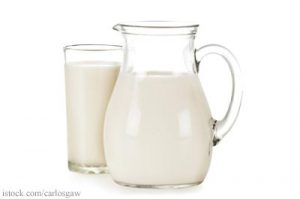Is raw milk easier to digest than pasteurized milk if you have lactose intolerance? Although raw milk advocates have long said that it is, a new study published in the Annals of Family Medicine shows it’s not.
 Researchers at Stanford studied 16 adults with self-reported lactose intolerance and lactose malabsorption confirmed by hydrogen breath testing. In a blind study, participants tested three kinds of milk: raw, pasteurized and soy in random order. Sugar-free vanilla syrup was added to mask the type of milk being tested. Participants tested each milk for eight days with a milk-free week between each test. On the first day of the test they drank 16 ounces of milk then added 4 ounces each day, reaching 24 ounces on the seventh day and returned to 16 oz on the eighth day.
Researchers at Stanford studied 16 adults with self-reported lactose intolerance and lactose malabsorption confirmed by hydrogen breath testing. In a blind study, participants tested three kinds of milk: raw, pasteurized and soy in random order. Sugar-free vanilla syrup was added to mask the type of milk being tested. Participants tested each milk for eight days with a milk-free week between each test. On the first day of the test they drank 16 ounces of milk then added 4 ounces each day, reaching 24 ounces on the seventh day and returned to 16 oz on the eighth day.
Researchers measured breath hydrogen levels and self-reported symptom severity from participants such as gas, audible bowel sounds, abdominal cramping, diarrhea. On the seventh day, the day with the highest dose, symptom severities were the same for raw and pasteurized milk. Compared with soy which is lactose-free, both dairy milks were associated with higher incidence of severe symptoms.
Study results led researchers to conclude that raw milk does not reduce lactose malabsorption or the symptoms of lactose intolerance. “These results do not support widespread anecdotal claims that raw milk reduces the symptoms of lactose intolerance,” the study’s abstract states.




